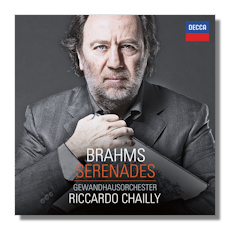
The Internet's Premier Classical Music Source
Related Links
- Brahms Reviews
- Latest Reviews
- More Reviews
-
By Composer
-
Collections
DVD & Blu-ray
Books
Concert Reviews
Articles/Interviews
Software
Audio
Search Amazon
Recommended Links
Site News
 CD Review
CD Review
Johannes Brahms

The Serenades for Orchestra
- Serenade #1 in D Major, Op. 11
- Serenade #2 in A Major, Op. 16
Gewandhaus Orchestra/Riccardo Chailly
Decca Classics 4786775
When I reviewed Riccardo Chailly leading the symphonies on Decca 4785344, I was thrilled by the playing but had a cautionary footnote regarding trying to rethink everything musically for every project. Since the back of the jewel case has a quote from the conductor to the effect of "Music must always be new", I was uncertain of how I would view this disc overall. Certainly, the same positive qualities that informed the symphonies with these same forces are here in abundance. Textures are clear, playing is gloriously warm, and if anything the sound is more present on this latter album. Chailly recorded the symphonies somewhat boringly with the Concertgebouw, and his latest efforts seem hell bent on being interesting.
It works better than expected in the serenades. A very quick opening tempo seems to herald a rushed program, but that happily doesn't prove true. Clear, crisp phrasing informs all of the conductor's recent projects, but this is music that can take that in stride. I still find certain sections to simply be too fast for Brahms, and that falls at the feet of the conductor. Chailly has been so good in all of his concerto collaborations for this composer that it's fair to wonder if he needs another strong will to make his Brahms mesh. Not that Nelson Freire or Vadim Repin (as pianist and violinist, respectively) were responsible for the rock-solid accompaniments or golden-age orchestral tones, but by the same token, nothing was ever rushed. That said, the "golden-age" part of that previous statement is gloriously upheld, and even at fleet tempos the playing never loses the weight and character that it requires. This stands in stark contrast to the symphonies, which were simply too light in places.
Some critics have been very harsh toward this disc so far, and I can truly understand their point-of-view. His earlier work is so much more powerful and physically exciting that you cannot help but lament his decision to do so much based on modern trends. Think of his Stravinsky, his Bruckner, or the best of his modern music. Aided by orchestras like Cleveland and the Concertgebouw, he earned his fame through a mix of great ideas and great execution. Now he sounds – at least in Brahms – like a new Charles Mackerras, except that the late English conductor was better at it. So although there is again much to admire, there's also a trend developing here that doesn't quite suit the conductor or his magnificent Gewandhaus Orchestra.
Copyright © 2015, Brian Wigman





















